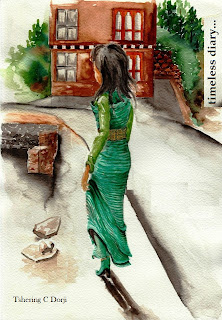Of corporal punishments, Dzongkha Lopens, Tae-Kwondo Master and Basketball Coach
When I first began my school in Damphu some two decades ago, I used to be shit scared on Mr. Alexander and his wife, Mrs. Devi. While the gentleman was known for being brute, the lady was known for her tongue. I still can't forget these two people. I passed my first few years of school life with sore bottom from KHEMPA “judgment.”
Then came the Dzongkha Lopen Phub Gyeltshen with full display of his doma tainted teeth. He was very generous with his sticks. Soon he was replaced by Lopen Dawa, who was really good, if not better at breaking tree twigs on the students’ bottom. I used to be a recipient of mistreatment of both the gentlemen.
Then came junior schooling. Things started to change. I graduated from KHEMPA to bamboo and cane. Like school children who pass out from kindergarten to primary school and then to junior and high school, the punishments also seem to move up the ladder. First came the khempa, then the bamboo, cane, and many branches and twigs in the middle. Interestingly pencils and scale which were used for learning were also used for punishing children. The teachers, especially the ones from Kerala, are notorious for putting the pencils between the fingers and then squeezing it.
In high school in Khaling, we were introduced to variety of punishments. In fact there were too many. Chamapion among the people were lopen Wookpa, Raghu, Lopen Freak and Levin. Interestingly, there were even people like Tae-Kwon-Do Master Sonam and basketball coach Chuma Sonam, who took liberty to punish students as they pleased. I think we were fortunate ones. Those who came from village schools are known to be treated to some nettle barks too.
We have lived in an era where sticks, bamboo and cane were part of our lives. Things have changed over the years. Most parents, who are educated now believe in the fact that children should be left to explore on their own. They have more things to see and learn. If anything else, people of our times were limited in many ways. We were suppressed and kept under the wicked eyes of many “unworthy” teachers. In fact, I still have not come to terms where Tae-Kwondo master and basketball coach could punish students just because they were appointed wardens.
However, I still would disagree about legislating the punishment at home by the parents. To legislate would be to make mockery of our own age old system. Actually, some minimal punishment is good even at school. When we do not know the standard and apply it for not so good reason, then it is a problem. Without proper study of the consequences and the local environment, it may be dangerous to apply the foreign ideas. Children in Bhutan enjoy the love, care and attention of the parents today. Sweet talks do not always work with children. In such cases, some form of reminders like twitching of ears sometimes may be needed.
Then came the Dzongkha Lopen Phub Gyeltshen with full display of his doma tainted teeth. He was very generous with his sticks. Soon he was replaced by Lopen Dawa, who was really good, if not better at breaking tree twigs on the students’ bottom. I used to be a recipient of mistreatment of both the gentlemen.
Then came junior schooling. Things started to change. I graduated from KHEMPA to bamboo and cane. Like school children who pass out from kindergarten to primary school and then to junior and high school, the punishments also seem to move up the ladder. First came the khempa, then the bamboo, cane, and many branches and twigs in the middle. Interestingly pencils and scale which were used for learning were also used for punishing children. The teachers, especially the ones from Kerala, are notorious for putting the pencils between the fingers and then squeezing it.
In high school in Khaling, we were introduced to variety of punishments. In fact there were too many. Chamapion among the people were lopen Wookpa, Raghu, Lopen Freak and Levin. Interestingly, there were even people like Tae-Kwon-Do Master Sonam and basketball coach Chuma Sonam, who took liberty to punish students as they pleased. I think we were fortunate ones. Those who came from village schools are known to be treated to some nettle barks too.
We have lived in an era where sticks, bamboo and cane were part of our lives. Things have changed over the years. Most parents, who are educated now believe in the fact that children should be left to explore on their own. They have more things to see and learn. If anything else, people of our times were limited in many ways. We were suppressed and kept under the wicked eyes of many “unworthy” teachers. In fact, I still have not come to terms where Tae-Kwondo master and basketball coach could punish students just because they were appointed wardens.
However, I still would disagree about legislating the punishment at home by the parents. To legislate would be to make mockery of our own age old system. Actually, some minimal punishment is good even at school. When we do not know the standard and apply it for not so good reason, then it is a problem. Without proper study of the consequences and the local environment, it may be dangerous to apply the foreign ideas. Children in Bhutan enjoy the love, care and attention of the parents today. Sweet talks do not always work with children. In such cases, some form of reminders like twitching of ears sometimes may be needed.

Comments